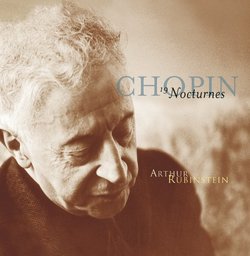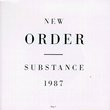| All Artists: Frederic Chopin, Artur Rubinstein Title: Arthur Rubinstein - Chopin 19 Nocturnes (Vol. 49) Members Wishing: 1 Total Copies: 0 Label: RCA Original Release Date: 1/1/1965 Re-Release Date: 8/8/2000 Album Type: Original recording remastered Genre: Classical Styles: Chamber Music, Historical Periods, Classical (c.1770-1830), Modern, 20th, & 21st Century Number of Discs: 2 SwapaCD Credits: 2 UPC: 090266304929 |
Search - Frederic Chopin, Artur Rubinstein :: Arthur Rubinstein - Chopin 19 Nocturnes (Vol. 49)
 | Frederic Chopin, Artur Rubinstein Arthur Rubinstein - Chopin 19 Nocturnes (Vol. 49) Genre: Classical
Despite Arthur Rubinstein's extroverted personality and open-hearted interpretive approach, his performances of Chopin's introspective, half-lit Nocturnes inspired him to some of his greatest recordings, as this, the last ... more » |
Larger Image |
CD DetailsSynopsis
Amazon.com Despite Arthur Rubinstein's extroverted personality and open-hearted interpretive approach, his performances of Chopin's introspective, half-lit Nocturnes inspired him to some of his greatest recordings, as this, the last of his three traversals of the 19, amply demonstrates. His earlier recordings, from 1936-37 and 1949-50, have their admirers, but this set dating from 1965 and 1967 is superior for its interpretive depth and realistic stereo sound. It's a touch slower than the earlier versions, and Rubinstein's glorious tone color, mastery of shadings, and unerring sense of rubato help make these among his greatest recordings. He makes the music breathe as few others have; the melodies go straight to the heart thanks to subtle phrasing that wrings worlds of emotion without wallowing. That sense of naturalness and inevitability in his playing can be heard in every one of these 19 works. It makes the start of Op. 27, No. 1 deeply moving and inspires awe at the way he brings structural clarity to Op. 48, No. 1 without compromising its mood. Others may have equaled his achievement in one or another of these works, but as a set, this is inspired pianism. --Dan Davis Similar CDsSimilarly Requested CDs
|
CD ReviewsSentiment, Yes. Sentimentality, No! Hank Drake | Cleveland, OH United States | 10/03/2000 (4 out of 5 stars) "Arthur Rubinstein's pianism was as noteworthy for what it lacked as for what it featured. One of the many factors (aside from the obvious technical and tonal ones) which made Rubinstein's Chopin so compelling was his refusal to cross the line separating sentiment (epathy) and sentimentality (schmaltz). The performances in this, Rubintein's third -- and final -- traversal of Chopin's Nocturnes are remarkably straightforward and direct. Each of the performances starts out simply, with natural phrasing and tactful, unobtrusive use of rubato. The structure of each piece is clear, and Rubinstein resists the temptation to linger over this-or-that phrase for "added emotional effect." Far from draining the emotional impact of these miniature masterworks, Rubinstein's performances actually heighten the impact of each piece, especially those in minor keys. Perhaps the greatest tribute to Rubinstein's treatment of these pieces is that even the most well known Nocturnes emerge as totally fresh works. The pianist, by the 1960s considered the "elder statesman" of Chopin, gives faithful renditions of these works, and this is the set I would recommend to someone hearing the Nocturnes for the first time. Yet it must also be stated that while Rubinstein's approach makes this an excellent reference set, I would not want to be without the more imaginative Nocturnes he recorded in the 1930s, which I frankly turn to more often for enjoyment. Another issue is that Rubinstein, whose hearing was failing by the 1960s, almost never plays a true pianissimo. RCA's excellent remastering of the mid-1960s stereo tape gives an accurate idea of the gorgeous sound Rubinstein could get from a piano." Going home GEORGE RANNIE | DENVER, COLORADO United States | 04/23/2003 (5 out of 5 stars) "I owned this recording of the Nocturnes on vinyl many years ago and have just got around to purchasing it on CD. I presently own many, many wonderful recordings of Chopin's Nocturnes. However, listening to the Rubinstein's recording again, after so many years, was like going home (in the best sense of the phrase). I love the Nocturnes; they are my favorite works of Chopin. All I can say is that Rubinstein's recordings are, indeed, the best! I love all my recordings of the Nocturnes; but the Artur Rubinstein's recording, of them, sooth my soul and emotionally move me down to the very marrow of my bones. The recording, honestly, moves me to tears. If you love Chopin and love his Nocturnes, as I do, buy this recording; there is none better!" Simply my favorite classical album justwarren | Westport, CT | 05/17/2006 (5 out of 5 stars) "I do not understand how people can not just love this CD set. I found the sound quality as good as any of the best Deutche Grammophon recordings I own. Rubinstein's interpretation of Chopin is, to my ear and musical sensibilities, just perfect. He is very nuanced in his every note without subjecting you to an over stylized interpretation. His performance is consistent, clear and overall the music makes sense, from the beginning to the end of each piece, his stylistic interpretations "fit" with each other. The "story" of each nocturne flows easily and effortlessly. I feel that Rubinstein's interpretation of these pieces presents them with the greatest focus on the music and not the musician, that I have ever heard. If you are a Chopin fan, or if you are totally new to classical music, this CD set is the one for you. If you wanted to have a classical music collection of only one "album", this one would be it!"
|

 Track Listings (10) - Disc #1
Track Listings (10) - Disc #1




![William Shakespeare's Romeo + Juliet: Music From The Motion Picture (1996 Version) [Enhanced CD]](https://nationalbookswap.com/cd//m/70/1370/241370.jpg)





